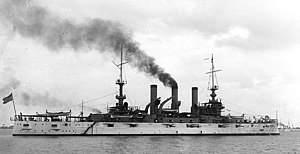 USS Vermont (BB-20)
| |
| History | |
|---|---|
| Name | Vermont |
| Namesake | Vermont |
| Builder | Fore River Shipyard |
| Laid down | 21 May 1904 |
| Launched | 31 August 1905 |
| Commissioned | 4 March 1907 |
| Decommissioned | 30 June 1920 |
| Stricken | 10 November 1923 |
| Fate | Sold for scrap, 30 November 1923 |
| General characteristics | |
| Class and type | Connecticut-class battleship |
| Displacement | |
| Length | 456 ft 4 in (139.09 m) |
| Beam | 76 ft 10 in (23.42 m) |
| Draft | 24 ft 6 in (7.47 m) |
| Installed power |
|
| Propulsion | |
| Speed | 18 kn (21 mph; 33 km/h) |
| Complement | 827 officers and men |
| Armament |
|
| Armor |
|
USS Vermont (BB-20), a Connecticut-class battleship, was the second ship of the United States Navy named after the 14th state. She was the third member of the class, which included five other ships. The Connecticut-class ships were armed with a main battery of four 12-inch (305 mm) guns and had a top speed of 19 knots (35 km/h; 22 mph). Vermont was laid down in May 1904 at the Fore River shipyard and launched in August 1905. The ship entered service with the Atlantic Fleet in March 1907.
Shortly after she entered service, Vermont joined the Great White Fleet for its circumnavigation of the globe in 1908–1909. She took part in the international Hudson–Fulton Celebration in New York in 1909 and made trips to Europe in 1910 and 1913. Thereafter, the ship became involved in interventions in several Central American countries, including the United States occupation of Veracruz during the Mexican Revolution, where two of her crew earned the Medal of Honor. During the United States' participation in World War I from April 1917 to November 1918, Vermont served as a training ship for engine room personnel. From November 1918 to June 1919, she made a series of trips to return American soldiers from Europe before being decommissioned in June 1920. She was sold for scrap in November 1923 according to the terms of the Washington Naval Treaty.